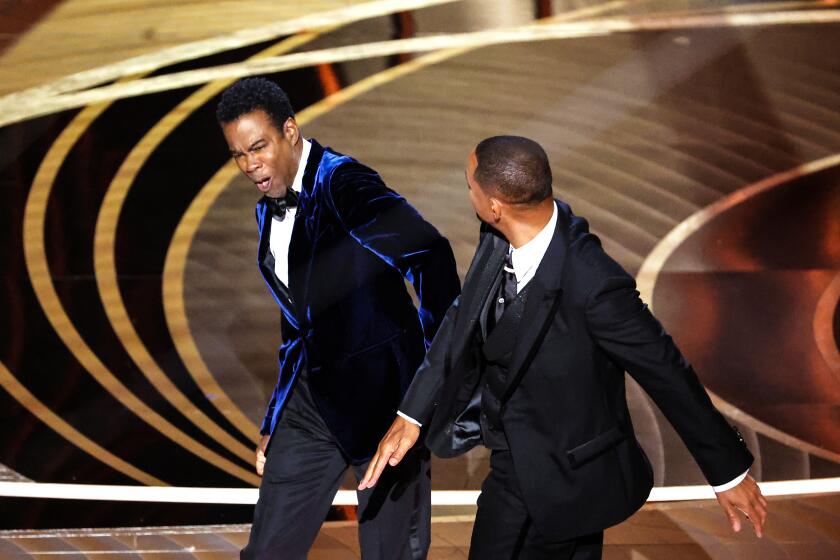The ‘best actress’ Oscar is a sexist Hollywood relic. Time to get rid of gendered awards

- Share via
As gender neutrality in workplaces and language increasingly becomes the norm, one of the remaining separations by gender is one of the most high-profile: the male and female categories for prestigious acting awards.
The Academy Awards show, a high-tech production televised around the world, is still handing out Oscars for leading performances in one category for actors and another for actresses — the way it first did nearly 95 years ago over dinner at the Hollywood Roosevelt Hotel. The Television Academy similarly bestows Emmys for performances in TV shows by gender in separate categories for men and women.
But other awards shows have dispensed with this industry shibboleth and let talented artists of any gender, including those who do not identify strictly as male or female, compete against one another for these coveted trophies. The Grammys went gender-neutral 10 years ago, doing away with distinctions between male and female singers. The MTV Movie and TV Awards have been gender-neutral since 2017. This year, the L.A. Film Critics Assn. did away with gendered categories for performers — and picked two winners in each acting category. Film Independent’s Spirit Awards show, which recognizes independent films at a celebrity-studded event near the Santa Monica Pier, has dropped gender categories for acting awards to be given out in March.
It makes sense for every awards organization that still uses it to scotch this outdated categorization. Why shouldn’t performances by all actors, regardless of gender designation, be judged together? They all work together in a movie or TV show. And the categorizations don’t fit every performer. Prominent nonbinary performers including Emma Corrin, who was nominated for but did not win an Emmy for their portrayal of Diana, Princess of Wales, in Season 4 of “The Crown,” have argued for non-gendered categories to include those who don’t solely identify as male or female. (Corrin was entered into one of the Emmy acting categories for women at a time when they were not using nonbinary pronouns, according to a BBC interview.)
Editorial: Hitting Chris Rock should cost Will Smith his invitation to next year’s Oscar show
Will Smith smacking Chris Rock was an indefensible act of violence. He shouldn’t be invited back next year.
But there’s one important thing to remember: Gender neutrality does not mean gender equality.
Dissolving gendered categories for Oscars or Emmys would not magically give women parity with men in accessing substantial acting roles and being celebrated for their work. Despite some notable recent gains for women, the entertainment industry is still weighted in favor of men. The last thing we would want to see are nongendered acting categories full of male nominees and winners.
For decades women had less access to substantial acting roles — the kind that get awards — although studies show there is improvement on this front. According to the 2022 UCLA Hollywood Diversity Report on films, women made up 47.2% of leads in 2021 films. The second part of the UCLA report on the 2020-21 season found that women made up 44.3% of broadcast scripted leads — and higher percentages in lead roles in cable and streamed shows. However, that still doesn’t mean women have as much access as men to the kinds of roles or the kinds of films that win awards. According to the UCLA film report, only 25% of films that won Oscars in any category at the 2021 show had a female lead.
But as Josh Welsh, the president of Film Independent, which puts on the Spirit Awards, said, “Keeping gendered award categories is not a solution to the problem. The change needs to come with diversifying the gatekeepers who make decisions about what films and shows get financed and marketed.”
He’s right, but awards still play a part in the ecosystem of Hollywood. An acting award can raise the profile and influence of the winner. It would be unsettling if a new approach to award-bestowing makes it even more difficult for women to win an award and achieve that profile.
But it’s past time to get rid of these categories — and we believe that awards shows can smartly lay out a plan to do that.
Film critic Justin Chang and columnist Glenn Whipp break down how ‘Tár’ won the day — but tied for best picture — at LAFCA’s annual awards vote.
When the nominations for the first nongendered Spirit Awards were announced, eight of 10 for best lead performance in a film were women. (Three of the 10 best supporting spots are occupied by women, and four of five nominees for best breakthrough performance are female.) Of course, Film Independent’s nominating committees are already looking for diversity among performers and story lines when they make their acting selections.
Both the Academy of Motion Picture Arts and Sciences (which hands out the Oscars) and the Television Academy (which awards Emmys for acting in 18 categories) are looking into the idea of nongender categories. Already, nominees for Oscars or Emmys can request their nomination certificates and awards with gender-neutral wording. That’s a good start, but they need to go further.
Other things worth considering: If the Oscars went gender-neutral, the Academy would need to expand the field to at least 10 nominees in each of the two acting categories. None of its other award categories, such as cinematography or directing, are gendered. But should the Academy give out only two awards (leading and supporting) instead of the usual four (leading performance and supporting performance by an actor and actress)? In one fell swoop the Academy would cut in half the awards performers can win and the ones that viewers most want to see. Perhaps the Academy could declare two winners in each category.
These are all issues that can be resolved. But first, the Oscars, the Emmys, the Golden Globes and any other awards shows using gender categories to judge performance need to drop this outdated practice.
More to Read
A cure for the common opinion
Get thought-provoking perspectives with our weekly newsletter.
You may occasionally receive promotional content from the Los Angeles Times.











